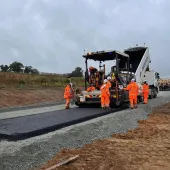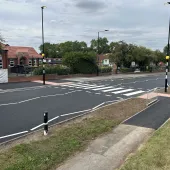ALARM findings suggest local roads in terminal decline

Survey finds 17 percent of local roads in poor structural condition with less than five years of life remaining
WITHIN the next five years one in six local roads will need to be repaired, or may even face closure, according to this year’s Annual Local Authority Road Maintenance (ALARM) survey, published today (28 March 2017).
The cumulative effect of an ageing network, decades of underfunding, increased traffic and wetter winters has led to around 17% of all local roads reported as being in poor structural condition, with less than five years of life remaining.
The ALARM survey, produced by the Asphalt Industry Alliance (AIA), is now in its 22nd year and is widely respected throughout industry and local and national government as the most authoritative and comprehensive study into local road maintenance funding and condition.
It again reports local authorities need more than £12 billion to bring the network up to scratch – a figure that has remained largely unchanged for four years – and the gap between the amount they received this year and the amount they say they need to keep the carriageway in reasonable order is almost £730 million.
Alan Mackenzie, chairman of the AIA, said: ‘Local authority highway teams do not have enough resources to arrest the terminal decline in the condition of our local roads and the network is not resilient enough to meet the challenges ahead.
‘Despite this, the efficiencies they have achieved in recent years through adopting an asset-management approach should be applauded.
‘Working smarter, greater collaboration and improved communication are all contributing to their ability to do more with less – though of course there will come a point when there are no further efficiency savings to be found.’
A large number of local authorities have also been hit with unforeseen costs (England: 43%; London: 53%; Wales: 56%), primarily as a result of structural failures caused by adverse weather and increased traffic, which have put additional pressure on resources.
The number of potholes filled over the last year has dropped again for the second successive year, but is still high at 1.7 million – one every 19 seconds.
‘Almost all journeys begin and end on a local road and we all rely on them every day,’ said Mr Mackenzie. ‘They represent an asset worth in excess of £400 billion but, at present, less than 1% of their value is being spent annually on maintenance.
‘Potholes are a symptom of poorly maintained roads and can have a serious effect on road users, but spending money fixing them in isolation, although essential, is wasteful. The most efficient way to deal with our crumbling roads is to fix them properly and stop potholes forming in the first place.
‘It is time we had a rethink about the future funding of our roads, otherwise we will end up with a network that is just not fit for purpose.’
Responding to the ALARM survey, Councillor Judith Blake, transport spokesperson at the Local Government Association (LGA), said: ‘It is becoming increasingly urgent to address the roads crisis we face as a nation.
‘Our roads are deteriorating at a faster rate than can be repaired and it would take more than £12 billion and be 2030 before we could bring them up to scratch and clear the current roads repair backlog.
‘Local authorities fixed a pothole every 19 seconds again last year despite significant budget reductions leaving them with less to spend on fixing our crumbling roads.
‘Councils are proving remarkably efficient in how they use this diminishing funding pot but they remain trapped in a frustrating cycle that will only ever leave them able to patch up our deteriorating roads.
‘Our roads crisis is only going to get worse unless we address it as a national priority. The Government’s own projections show an 85.5% increase in congestion by 2040.
‘Councils desperately need long-term and consistent funding to invest in the resurfacing projects which our road network needs over the next decade.’
ALARM Survey 2017 Quick Facts:
- £12.06 billion – estimated one-time cost to get roads in England and Wales back into reasonable condition.
- £85.7 million per authority – estimated one-time catch-up cost in England to get roads back into reasonable condition (£21.4 million in London; £26.9 million in Wales).
- £5.0 million per authority – average annual carriageway maintenance budget shortfall in England (£2.5 million in London; £3.7 million in Wales).
- 13 years – time needed to clear the backlog in England (10 years in London; nine years in Wales).
- 17% of local roads in England reported as having less than five years life remaining (16% in London; 18% in Wales).
- 55 years – average time before a road is resurfaced in England (23 years in London; 63 years in Wales).
- 1.5 million – number of potholes filled in England (72,544 in London; 141,020 in Wales).
The full 2017 ALARM survey can be downloaded from www.asphaltuk.org









